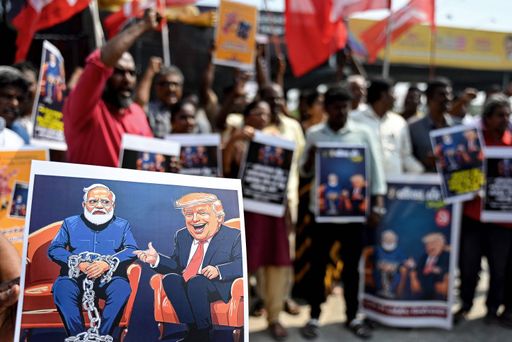A top economic adviser of President Donald Trump has doubled down on the administration's decision to impose punitive 50 percent tariffs on Indian products, saying Trump will not yield should India remain steadfast on its policy of buying cheap Russian oil that US says is bankrolling Moscow's war on Ukraine.
"If the Indians don't budge, I don't think President Trump will," US National Economic Council Director Kevin Hassett told local media on Wednesday.
Hassett said trade negotiations with New Delhi are "complicated", adding, "it's integrated some with the problems that we trying to put extra pressure on Russia so that we can get a peace deal to save millions of lives and the Indian intransigence about opening their markets to our products."
"…There are going to be ebbs and flows in things before we reach the final position," he said.
The US begun imposing a punitive 50 percent tariff on all Indian-origin goods, ramping up pressure on the Asian nation over its growing energy and defence ties with Russia, a country that US says could next face "economic war" if it doesn't make peace with Ukraine.
From Wednesday, Indian exports were subjected to substantial US duties — among the highest imposed by Washington.
This follows President Trump's announcement of additional tariffs earlier in August, which he stated was in response to New Delhi's increased procurement of Russian oil and defence equipment.
These tariffs arise as the US seeks enhanced access to India's agricultural and dairy markets. Despite five negotiation rounds for a trade accord, a deal remains elusive.
This is mainly because New Delhi has hesitated to open these sectors to more affordable American imports, fearing job losses for millions of Indians.
Indian Prime Minister Narendra Modi has pledged to protect Indian farmers' interests, regardless of the cost.
"I am fully aware that I may have to pay a very heavy price personally, but I am prepared for it. For the farmers of my country, for the fishermen of my country, for the dairy farmers of my country, India stands ready today," Modi said earlier this month.

India says US tariffs poses economic challenges
The immediate impact of US tariffs on Indian exports appears limited, but the ripple effects on the economy pose challenges that must be addressed, India's Finance Ministry said in its July monthly economic review, released on Wednesday.
The report by the ministry said ongoing India-US trade negotiations "will be crucial".
India is pursuing a diversified trade strategy, which includes its recent trade deal with Britain and some European nations. It also has ongoing talks with New Zealand and the European Union, among others, to sustain its "resilient trade performance".
However, "these initiatives will take time to show results and may not fully address the shortfall in exports to the United States that may arise if the current tariff rates on India persist."
On Wednesday, US Treasury Secretary Scott Bessent stated that the high tariffs are "not just over India's purchase of Russian oil", but also due to the protracted nature of the ongoing trade deal talks.
"I'd thought we'd have a deal in May or June; that India could be one of the earliest deals. But they, kind of, tapped us along," he told Fox Business.
Asked if he worries that India will set trade in the rupee and not the US dollar, Bessent said, "There are a lot of things I worry about. The rupee becoming a reserve currency is not one of them. The rupee is at an all time low against the US dollar."
Bessent recently told CNBC in a recent interview that Russian oil now accounted for 42 percent of India's total oil purchases, up from under 1 percent before the war, and contrasted that with longtime buyer China, whose Russian oil purchases had increased to 16 percent from 13 percent.
"India is just profiteering. They are reselling," Bessent said. "What I would call Indian arbitrage — buying cheap Russian oil, reselling it as product has just sprung up during the war — which is unacceptable," he said.



















